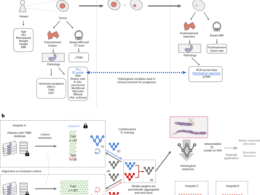This is a republication of the article authored by Tomislav Mihaljevic.
Linkedin
Tomislav Mihaljevic
President and Chief Executive Officer at Cleveland Clinic
April 28, 2022
Medical information is proliferating like never before.
In addition to the more than 1 million scientific papers and journal articles published last year, we are gathering a massive amount of patient-specific data.
Our knowledge of diseases and medications — and the biological mechanisms related to both — is expanding exponentially. The ability to analyze, interpret and apply this information for the benefit of patients is critical.
AI is helping us to put this wealth of knowledge to use, efficiently and effectively.
Our knowledge of diseases and medications — and the biological mechanisms related to both — is expanding exponentially. The ability to analyze, interpret and apply this information for the benefit of patients is critical.
AI is helping us to put this wealth of knowledge to use, efficiently and effectively.
Today, Cleveland Clinic hosted the US Chamber of Commerce and the Commission on Artificial Intelligence Competitiveness, Inclusion, and Innovation, which heard testimony on the use of artificial intelligence in healthcare and how AI can be leveraged to benefit society.
At Cleveland Clinic, the patient is our primary stakeholder. Everything we do is based on how it impacts the patient.
AI is no different.
Caregivers from throughout the enterprise are devoting much time, effort and thought into understanding … from a patients’ perspective … what it means to undertake AI research and adopt AI applications.
Caregivers from throughout the enterprise are devoting much time, effort and thought into understanding … from a patients’ perspective … what it means to undertake AI research and adopt AI applications.
Cleveland Clinic is a leader in using AI to advance medical research and improve patient care. We are using AI in a multitude of ways, including:
- to predict the risk of atrial fibrillation recurrence
- to uncover an association between COVID-19 and Alzheimer’s-like dementia
- to deliver personalized radiation therapy to patients with cancer
- to enhance epilepsy surgery to enable patients to live seizure free
- to better characterize neurological disease, in collaboration with the NFL Players Association
- and to identify potential new uses for existing drugs. A recent study identified sildenafil — also known as Viagra — as a promising drug candidate to help prevent and treat Alzheimer’s disease.
Each of these findings were hastened through the use of AI.
AI is changing medicine for the better. It holds the power to help us answer the most pressing clinical questions. It is pushing the pace of discovery.
While AI will play a prominent role in the future of medicine, we must remember that it is a tool. It cannot provide care. It cannot offer empathy.
While AI will play a prominent role in the future of medicine, we must remember that it is a tool. It cannot provide care. It cannot offer empathy.
One thing that will not change is the importance of human interactions in medicine. Whatever technological advances are to come, caregivers will never lose sight of the noble purpose we have to care for others.
Originally published at https://www.linkedin.com.












